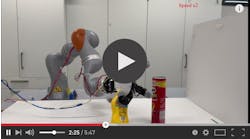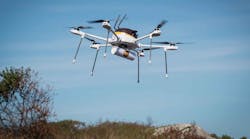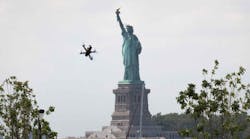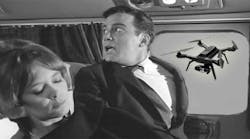With the U.S. Federal Aviation Administration (FAA) gradually opening up the sky ways to commercial drone use, UPS has begun preparing for the day when delivery drone are as ubiquitous as those big brown vans.
In partnership with drone manufacturer CyPhy Works, the global logistics leader executed a mock delivery of an asthma inhaler to an island three miles off the Massachusetts coast.
“Drone technology used in this way can save lives and deliver products and services to places that are difficult to reach by traditional transit infrastructures,” says Helen Greiner, CyPhy’s founder and chief technology officer.
For the test, UPS used the Persistent Aerial Reconnaissance and Communications (PARC) system, which can operate at an altitude of 400 ft and payload of 4 to 6 lb. It provides high frame rate, unbroken High Definition video and the combined EO/ IR camera allows for night vision. The secure communications cannot be jammed or intercepted. The durable drone also has a backup battery to return to base in case of equipment failure.
The UPS Strategic Enterprise Fund invested in CyPhy to further its drone initiative. The company has already used drones in warehouses to visually check high storage racks and confirm available space, UPS says.
The FAA released expanded rules for commercial drone pilots in August, and as the regulatory agency hashes out how to safely manage air space populated by passenger planes and delivery drones, companies including UPS and Amazon — which is developing the 55-lb Prime Air — are readying for takeoff.
“Our focus is on real-world applications that benefit our customers,” said Mark Wallace, UPS senior vice president of global engineering and sustainability. “We think drones offer a great solution to deliver to hard-to-reach locations in urgent situations where other modes of transportation are not readily available.”
















